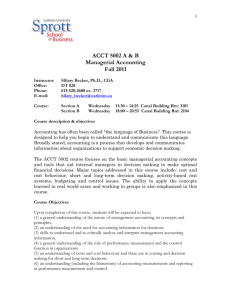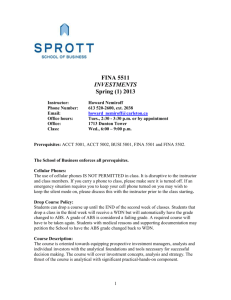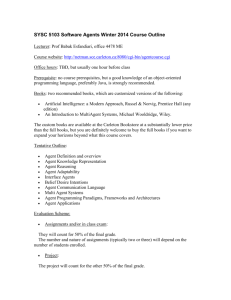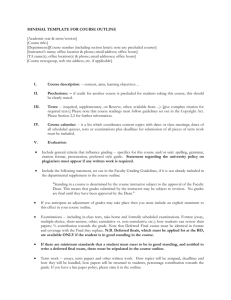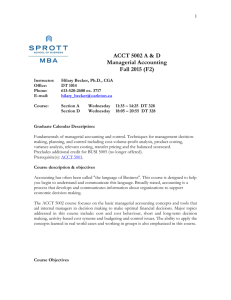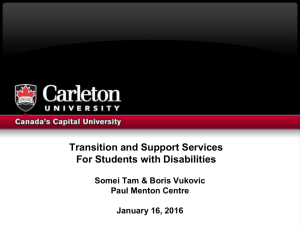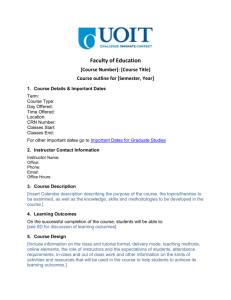ACCT 5002 revised
advertisement
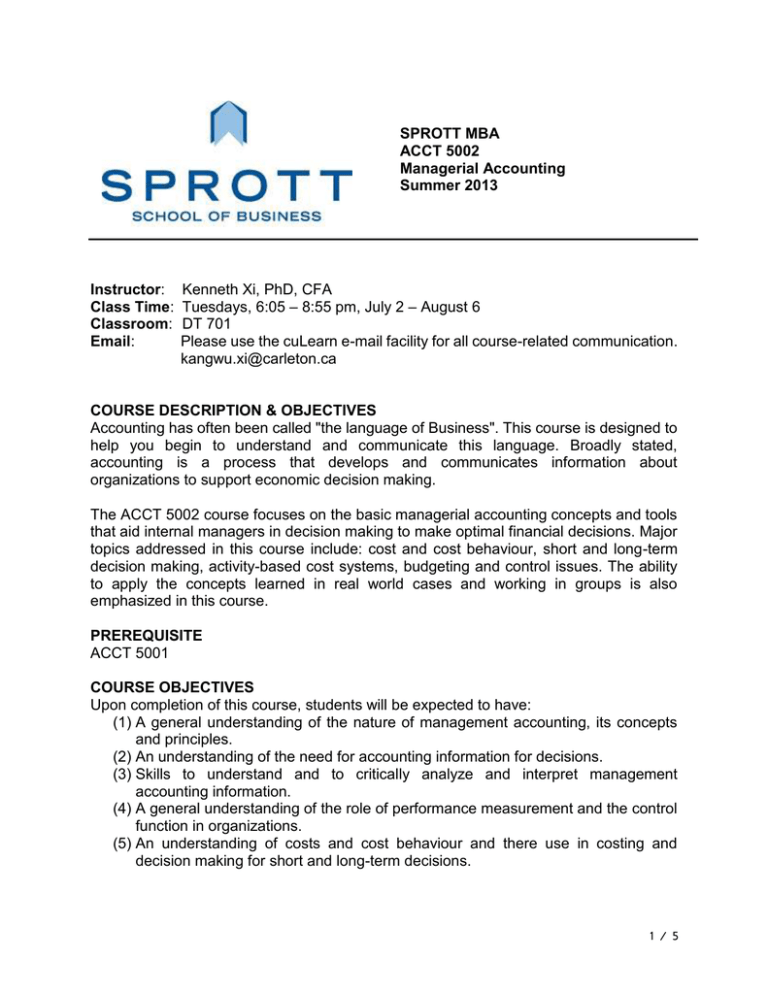
SPROTT MBA ACCT 5002 Managerial Accounting Summer 2013 Instructor: Class Time: Classroom: Email: Kenneth Xi, PhD, CFA Tuesdays, 6:05 – 8:55 pm, July 2 – August 6 DT 701 Please use the cuLearn e-mail facility for all course-related communication. kangwu.xi@carleton.ca COURSE DESCRIPTION & OBJECTIVES Accounting has often been called "the language of Business". This course is designed to help you begin to understand and communicate this language. Broadly stated, accounting is a process that develops and communicates information about organizations to support economic decision making. The ACCT 5002 course focuses on the basic managerial accounting concepts and tools that aid internal managers in decision making to make optimal financial decisions. Major topics addressed in this course include: cost and cost behaviour, short and long-term decision making, activity-based cost systems, budgeting and control issues. The ability to apply the concepts learned in real world cases and working in groups is also emphasized in this course. PREREQUISITE ACCT 5001 COURSE OBJECTIVES Upon completion of this course, students will be expected to have: (1) A general understanding of the nature of management accounting, its concepts and principles. (2) An understanding of the need for accounting information for decisions. (3) Skills to understand and to critically analyze and interpret management accounting information. (4) A general understanding of the role of performance measurement and the control function in organizations. (5) An understanding of costs and cost behaviour and there use in costing and decision making for short and long-term decisions. 1/5 (6) An understanding (including the limitations) of accounting measurements and reporting in performance measurement and control. TEXTBOOK Custom publication available at the bookstore for ACCT 5002 GRADING SCHEME ACCT 5002 Participation Individual Assignment (case) Group Assignment Final Exam (August 13) 10% 20% 20% 50% In the ACCT 5002 course, there will be one individual case (either case week 3 or 4) and one group case assignment designed to integrate the material from the course. The cases are due at the beginning of the class assigned to submit the case. Late cases will not be accepted. Participation is critical in a course like this. To gain a full understanding of the material, students are expected to participate in each class. Learning outcomes are enhanced when students share experiences and knowledge. There will be one examination scheduled during the formal examination period which will encompass all the material from ACCT 5002. METHOD OF INSTRUCTION Class sessions entail a mixture of lecture, case study, problem analysis, and class discussion. Lectures emphasize major topics and concepts. It requires active learning, which means that the student must take responsibility for the learning that takes place. You are encouraged to ask questions and to stimulate discussion on topics that you have difficulty understanding. How to do well in this course: COME TO CLASS, COME TO TUTORIALS AND PRACTICE, PRACTICE, PRACTICE… To perform well in this course, you must spend time answering extra problems and checking the answers to test their understanding. To maximize your learning, you should make an honest attempt at the question before peeking at the solution. Simply reading a question and then turning to the solution right away is next to useless. You will find that there is likely to be a direct correlation between the number of problems you prepare, your attendance in class and your course grade. 2/5 CLASS ETIQUETTE Late arrival should be an exception. When necessary, sit on entering side; do not disturb the class. Early departure should be an exception also. Early preparation for departure - please don't. Talking - with everyone or with no one. Cell phones and other electronic noises....off. TOPICAL COVERAGE Week Date Topic 1 July 2 Cost and Cost Behaviour/Cost-Volume –Profit Analysis 2 July 9 Product Costing and Activity Based Costing 3 July 16 Budgeting Chapter 2 and 3 4 and 5 6 4 July 23 Variance Analysis 5 July 30 Short-run Decision Making 6 August 6 Performance Measurement and the 13 and 24 Balanced Scorecard August 13 FINAL EXAM PROBLEMS TO WORK ON Week Date Chapter 1 July 2 2&3 Cases 7 (excl p. Individual 259-264) Case 11 Group Case 2 July 9 4&5 3 July 16 6 Problems 2-16, 2-20, 2-22, 2-29, 2-33 3-13, 3-18, 3-21, 3-24, 3-25, 3-28, 3-35, 3-40, 3-49 4-23, 4-25, 4-28, 4-32, 4-36, 4-37, 4-41 5-18, 5-20, 5-21, 5-25, 5-28, 5-31, 5-32, 5-36 6-17, 6-18, 6-19, 6-20, 6-21, 6-22, 6-29, 6-31, 6-34 4 July 23 7 7-18, 7-21, 7-24, 7-25, 7-32, 7-33, 7-34 5 July 30 11 11-18, 11-19, 11-20, 11-23, 11-26, 11-27, 11-29, 11-38 6 August 6 13 & 24 13-16, 13-18, 13-22, 13-23, 13-29, 13-34 24-18, 24-20, 24-23, 24-25, 24-37 3/5 Summer Term 2013 May 6 Early summer and full summer classes begin. May 13 Last day for registration and course changes for early summer courses. May 17 Last day for registration and course changes for full summer courses. May 20 Statutory holiday. University closed. May 31 Last day to withdraw from early summer courses with full fee adjustment. June 7 Last day to withdraw from full summer courses with a full fee adjustment Last day to submit to the Paul Menton Centre for Students with Disabilities, formal Examination Accommodation Forms for June examinations. June 14 MBA early summer classes end June 17-21 MBA early summer exams and final deliverables June 24-28 MBA class break June 30 Final deadline for summer term fee payment. July 1 Statutory holiday. University closed. July 2 Late summer classes begin. Full summer classes resume. July 9 Last day for registration and course changes for late summer courses. July 19 Last day for withdrawal from late summer courses with full fee adjustment. July 26 Last day to submit to the Paul Menton Centre for Students with Disabilities, Formal Examination Accommodation Forms for August examinations. 4/5 August 5 Statutory Holiday. University closed. August 14 Last day of late summer and full summer classes. Last day for academic withdrawal from late summer and full summer courses and any other courses that end this term. Last day for handing in term assignments, subject to any earlier course deadline. August 16 Summer Co-op Work Term Reports are due. August 17-22 Summer examinations may be held. Examinations are normally held in the day and evening during the Monday to Saturday period. In exceptional circumstances, it may be necessary to schedule an examination on a Sunday. September 27-28 Summer term deferred final examinations will be held. Examinations are normally held in the day and evening. September 30 Last day for receipt of applications for review of final grades for summer term courses. CHANGES TO THE SYLLABUS A syllabus is a tool to help you plan your time. Every effort is made to make the syllabus as complete as possible, but there may be occasions when changes are required. The instructor will announce any deviations from the syllabus in class and the change will be posted on the course web page. IMPORTANT ADDITIONAL INFORMATION Required calculator in BUSI course examinations If you are purchasing a calculator, we recommend any one of the following options: Texas Instruments BA II Plus (including Pro Model), Hewlett Packard HP 12C (including Platinum model), Staples Financial Calculator, Sharp EL-738C & Hewlett Packard HP 10bII Group work The Sprott School of Business encourages group assignments in the school for several reasons. They provide you with opportunities to develop and enhance interpersonal, communication, leadership, follower-ship and other group skills. Group assignments are also good for learning integrative skills for putting together a complex task. Your professor may assign one or more group tasks/assignments/projects in this course. Before embarking on a specific problem as a group, it is your responsibility to ensure that the problem is meant to be a group assignment and not an individual one. 5/5 Medical certificate Please note that in all occasions that call for a medical certificate you must use or furnish the information demanded in the standard university form. http://www2.carleton.ca/registrar/forms/ Academic Accommodations for Students with Disabilities The Paul Menton Centre for Students with Disabilities (PMC) provides services to students with Learning Disabilities (LD), psychiatric/mental health disabilities, Attention Deficit Hyperactivity Disorder (ADHD), Autism Spectrum Disorders (ASD), chronic medical conditions, and impairments in mobility, hearing, and vision. If you have a disability requiring academic accommodations in this course, please contact PMC at 613-520-6608 or pmc@carleton.ca for a formal evaluation. If you are already registered with the PMC, contact your PMC coordinator to send me your Letter of Accommodation at the beginning of the term, and no later than two weeks before the first in-class scheduled test or exam requiring accommodation (if applicable). After requesting accommodation from PMC, meet with me to ensure accommodation arrangements are made. Please consult the PMC website for the deadline to request accommodations for the formally-scheduled exam (if applicable). Religious observance Students requesting academic accommodation on the basis of religious observance should make a formal, written request to their instructors for alternate dates and/or means of satisfying academic requirements. Such requests should be made during the first two weeks of class, or as soon as possible after the need for accommodation is known to exist, but no later than two weeks before the compulsory academic event. Accommodation is to be worked out directly and on an individual basis between the student and the instructor(s) involved. Instructors will make accommodations in a way that avoids academic disadvantage to the student. Students or instructors who have questions or want to confirm accommodation eligibility of a religious event or practice may refer to the Equity Services website for a list of holy days and Carleton's Academic Accommodation policies, or may contact an Equity Services Advisor in the Equity Services Department for assistance. Pregnancy Pregnant students requiring academic accommodations are encouraged to contact an Equity Advisor in Equity Services to complete a letter of accommodation. The student must then make an appointment to discuss her needs with the instructor at least two weeks prior to the first academic event in which it is anticipated the accommodation will be required. Plagiarism 6/5 The University Senate defines plagiarism in the regulations on instructional offenses as: "to use and pass off as one's own idea or product work of another without expressly giving credit to another." Borrowing someone else's answers, unauthorized possession of tests or answers to tests, or possession of material designed in answering exam questions, are also subject to university policy regarding instructional offences. For more information on Carleton University's Academic Integrity Policy, consult: http://www1.carleton.ca/studentaffairs/academic-integrity/ 7/5

